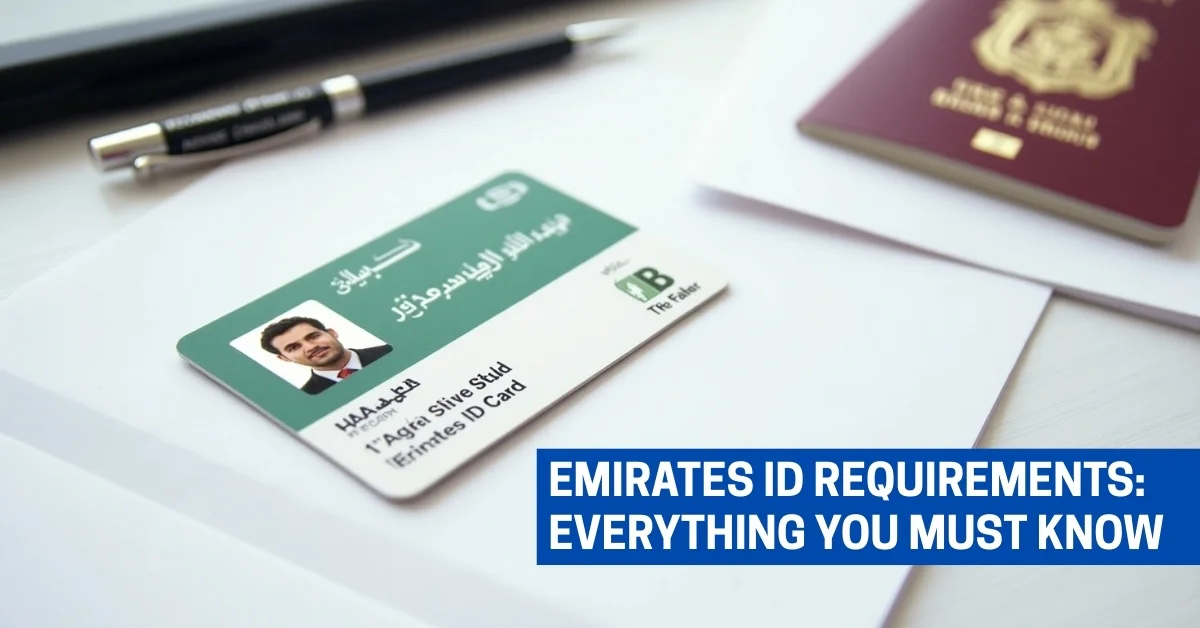Living in the UAE comes with certain legal responsibilities, and one of the most important is having an Emirates ID. The Emirates ID is provided by the Federal Authority for Identity, Citizenship, Customs & Port Security (ICP) and is compulsory for every UAE citizen and resident. Understanding the Emirates ID requirements is essential because it allows you to access government services, open bank accounts, and prove your identity in everyday life.
What is an Emirates ID?
The Emirates ID is the national identification card for UAE nationals, GCC citizens living in the UAE, and expatriates holding a residence visa. It contains biometric information, including your fingerprints and photograph, making it a secure and reliable form of identification.
Issued by the ICP authority, the Emirates ID is more than just a card; it is your legal identity in the UAE. It is required for almost every official transaction, from medical appointments to employment documentation.
The Importance of the Emirates ID in the UAE
The Emirates ID plays a vital role in the daily lives of residents and citizens. Without it, many essential services cannot be accessed. Some of the main uses include:
- Banking: Opening an account, applying for loans, and obtaining credit card approvals.
- Telecommunications: Getting a mobile SIM card or internet connection.
- Healthcare: Registering at hospitals or clinics and using insurance.
- Government services: Applying for visas, registering vehicles, and utility connections.
Simply put, the Emirates ID is the key to hassle-free living in the UAE.
Who Needs an Emirates ID?
Every legal resident and citizen of the UAE must carry an Emirates ID. This includes:
- UAE Nationals: All Emirati citizens are required to have an Emirates ID from birth.
- GCC Nationals: Citizens of Gulf countries living in the UAE must also apply for one.
- Expatriates: Anyone with a UAE residence visa, whether for work, study, or family sponsorship, must hold a valid Emirates ID.
Emirates ID Requirements for Application
When applying for an Emirates ID, it’s important to provide the right set of documents. Missing or incorrect paperwork can cause delays in processing or even rejection of your application. The requirements are slightly different depending on whether you are a UAE national, a GCC national, or an expatriate with a residence visa.
1. General Documents Required
These are the basic documents that almost everyone needs to submit:
- Valid passport (original and copy): Used to verify your identity and nationality.
- Valid UAE residence visa (for expats): Confirms your legal right to live in the UAE.
- Passport-size photographs (recent, white background): Needed for your Emirates ID card and biometric records.
2. Additional Requirements for UAE Nationals
UAE citizens need to provide extra documents to prove their family registration.
- Family book copy (Khulasat Al Qaid): Serves as official proof of Emirati citizenship.
- Birth certificate (for minors): Required to issue IDs for children.
3. Additional Requirements for GCC Nationals
GCC citizens living in the UAE must show proof of residence.
- Residence evidence (rental contract, employment letter, or utility bill): Confirms that you are living in the UAE legally and need an Emirates ID.
4. Additional Requirements for Expats
Expatriates applying for the Emirates ID must link their application to their visa and work status.
- Entry permit or residence visa page in passport: Confirms that you are in the UAE under a legal visa category.
- Work contract or trade license (sometimes requested): Used to validate your employment or business sponsorship.
How to Apply for an Emirates ID
You can apply either online or in person, depending on your preference.
1. Online via ICP Website or App
- Visit the ICP website or download the ICP app.
- Fill in the online application form.
- Upload the required documents.
- Pay the applicable fees.
- Book an appointment for biometrics.
2. In-Person at Typing Centres or Amer Centres
- Visit an authorized typing or Amer center.
- Submit your documents and let them complete the application form.
- Provide biometric data such as fingerprints, signature, and photograph.
- Pay the required fees and wait for confirmation.
Emirates ID Fees and Processing Time
The cost of applying for an Emirates ID varies based on the validity of your residence visa, but in general, the fees are affordable and standardized across categories. Once the application is submitted, the average processing time is around 5 to 10 working days. However, applicants should be prepared for possible delays if documents are missing, information is incorrect, or if applications are submitted during busy periods when demand is high.
Renewal of Emirates ID
Keeping your Emirates ID valid is important to avoid penalties.
1. When Should You Renew?
- Apply for renewal 30 days before expiry.
- A grace period may apply, but fines are charged for late renewal.
2. Renewal Requirements
- Valid passport and UAE residence visa
- Your old Emirates ID card
- Passport-size photograph (if required)
Replacement of Emirates ID (Lost or Damaged)
If your Emirates ID is lost, stolen, or damaged, you must apply for a replacement immediately.
1. Steps to Get a Replacement
- Report the loss or damage to the ICP.
- Apply for a replacement via the ICP website, app, or Amer center.
- Submit the required documents (passport, visa, and a copy of the lost ID if available).
- Pay the replacement fee and collect the new card.
Fines and Legal Consequences of Not Having an Emirates ID
Not renewing or carrying your Emirates ID can lead to serious problems. Some of the consequences include:
- Overstaying without renewal: Delays can result in fines starting from AED 20 per day.
- Banking and healthcare restrictions: Many services will be denied without a valid Emirates ID.
- Government penalties: Additional fines and possible visa issues if ignored.
Key Tips for a Smooth Emirates ID Application
Applying for your Emirates ID can be stress-free if you follow a few practical steps:
- Book your biometric appointment early to avoid delays.
- Make sure your photo meets the official ICA standards.
- Double-check all documents before submission.
- Track your application status on the ICP website.
Moving Your Business to Dubai with Ripple
If you’re looking to relocate your business to Dubai, Ripple (ripplellc.ae) offers seamless and transparent setup assistance from company formation in free zones to handling licensing, visas, and bank accounts, all under one roof. They guide you through every step with clear pricing, speedy licensing, and no hidden service fees. For a smooth process tailored to your needs, reach out via info@ripplellc.ae
Or call +971 50 593 8101 or +971 4 250 0833, and let their team make your transition to Dubai effortless.
Conclusion
This official identification card is issued by the Federal Authority for Identity, Citizenship, Customs & Port Security (ICP) and is mandatory for all citizens and residents.The Emirates ID is more than just an identification card; it is your legal identity in the UAE. From accessing government services to handling daily transactions, it plays a crucial role in every resident’s life. By understanding the Emirates ID requirements and ensuring timely application or renewal, you can avoid unnecessary delays, fines, and legal issues. Always keep your card safe, updated, and valid to enjoy a hassle-free stay in the UAE.






